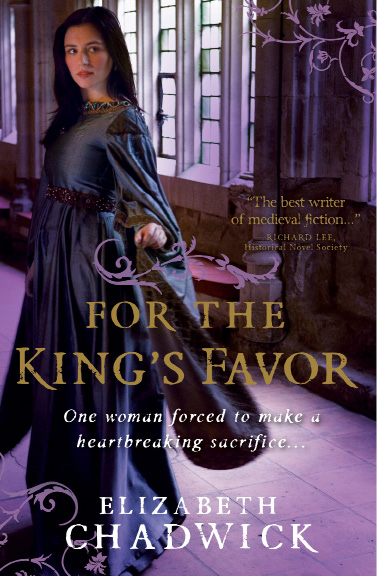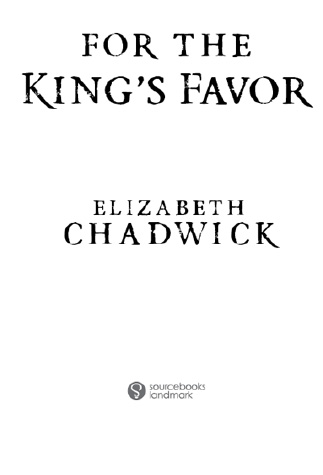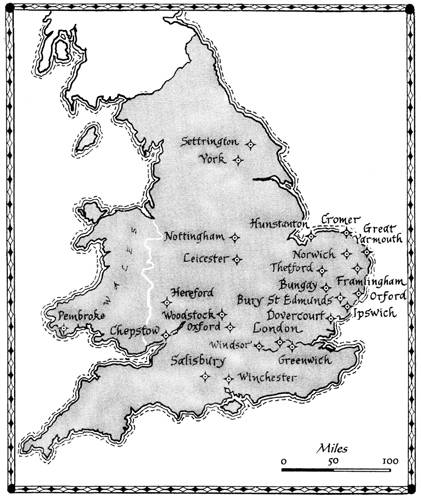For the King’s Favor
Read For the King’s Favor Online
Authors: Elizabeth Chadwick



Copyright © 2010 by Elizabeth Chadwick
Cover and internal design © 2010 by Sourcebooks, Inc.
Cover photography by Jeff Cottenden
Cover images © Shutterstock.com
Sourcebooks and the colophon are registered trademarks of Sourcebooks, Inc.
All rights reserved. No part of this book may be reproduced in any form or by any electronic or mechanical means including information storage and retrieval systems—except in the case of brief quotations embodied in critical articles or reviews—without permission in writing from its publisher, Sourcebooks, Inc.
The characters and events portrayed in this book are fictitious and used fictitiously. Apart from well-known historical figures, any similarity to real persons, living or dead, is purely coincidental and not intended by the author.
Published by Sourcebooks Landmark, an imprint of Sourcebooks, Inc.
P.O. Box 4410, Naperville, Illinois 60567-4410
(630) 961-3900
Fax: (630) 961-2168
www.sourcebooks.com
Originally published in Great Britain in 2008 by Sphere
Library of Congress Cataloging-in-Publication Data
Chadwick, Elizabeth.
For the king’s favor / by Elizabeth Chadwick.
p. cm.
1. Knights and knighthood—Fiction. 2. Great Britain—History—Henry II, 1154-1189—Fiction. I. Title.
PR6053.H245F67 2010
823’.914—dc22
2010010674
Arise my love, my fair one,
And come away;
For lo, the winter is past,
the rain is over and gone,
the flowers appear on the earth,
the time of singing has come.
—
The Song of Solomon


Framlingham Castle, Suffolk, October 1173
Roger Bigod woke and shot upright on a gulp of breath. His heart was slamming against his rib cage and, although the parted bed curtains showed him a chamber sun-splashed with morning light, his inner vision blazed with vivid images of men locked in combat. He could hear the iron whine of blade upon blade and the dull thud of a mace striking a shield. He could feel the bite of his sword entering flesh and see blood streaming in scarlet ribbons, glossy as silk.
“Ah God.” Roger shuddered and bowed his head, his hair flopping over his brow in sweaty strands the colour of tide-washed sand. After a moment, he collected himself, threw off the bed coverings with his right hand, and went to the window. Clenching his bandaged left fist, he welcomed the stinging pain like a penitent finding comfort in the scourge. The wound was not deep enough to cause serious damage but he was going to have a permanent scar inscribed across the base of three fingers. The soldier who had given it to him was dead, but Roger took no pleasure in the knowledge. It had been kill or be killed. Too many of his own men had fallen yesterday. His father said he was useless, but it was a habitual opinion and Roger no longer felt its impact beyond a dull bruise. What did abrade him were the unnecessary deaths of good soldiers. The opposition had been too numerous and his resources insufficient to the task. He looked at his taut fist. There would be a lake of blood before his father’s ambition was done.
To judge from the strength of the daylight he had missed mass. His stepmother would delight in berating him for his tardiness and then comment to his father that his heir wasn’t fit to inherit a dung heap, let alone the Earldom of Norfolk when the time came. And then she would look pointedly at her own eldest son, the obnoxious Huon, as if he were the answer to everyone’s prayers rather than the petulant adolescent brat he actually was.
Framlingham’s bailey was packed with the tents and shelters of the mercenaries belonging to Robert Beaumont, Earl of Leicester—an ill-assorted rabble he had plucked from field and town, ditch, gutter, weaving shed, and dockside on his way from Flanders to England. Few of them were attending mass to judge by the numbers infesting the inner and outer wards. They were locusts, Roger thought with revulsion. By joining the rebellion against King Henry and giving lodging and support to the Earl of Leicester, his father had encouraged a plague to descend on them, in more ways than one. The plot was to overthrow the King and replace him with his eighteen-year-old son Henry—a vain boy who could be turned this way and that by men skilled in manipulation and the machinations of power. Roger’s father had no love for the King, who had clamped down hard on his ambition to rule all of East Anglia. Henry had confiscated their castle at Walton and built a strong royal fortress at Orford to neutralise their grip on that part of the coastline. To add insult to injury, fines for the earlier insurgency had gone to assist the building of Orford.
Turning from the window, Roger sluiced his face one-handed in the ewer at the bedside. Since the tips of his fingers and his thumb were free on his bandaged side, he managed to dress himself without summoning a servant. From the moment he had been capable of tying his braies in small childhood, a fierce sense of self-reliance had driven him to perform all such tasks for himself.
On opening the coffer containing his cloaks, his eyes narrowed as he noticed immediately that his best one with the silver braid was missing. He could well guess where it was. While donning his everyday mantle of plain green twill, his gaze lit on the weapons chest standing against the wall. Last night his scabbarded sword had been propped against it, waiting to be checked and cleaned before storage, but now it was gone. Roger’s annoyance turned to outright anger. His sword had been a gift from his Uncle Aubrey, Earl of Oxford, at the time of his knighting. This time the thieving little turd had gone too far.
With clamped jaw, Roger strode from the chamber and headed purposefully to the chapel adjoining the hall where mass had just finished and people were filing out to attend their duties. Roger concealed himself behind a pillar as his father walked past deep in conversation with Robert, Earl of Leicester. They were an incongruous pair, Leicester being tall and slender with a natural grace and good humour, and his father with a rolling pugilistic gait reminiscent of a sailor heading from ship to alehouse. His paunch strained the seams of his red tunic and his hair hung in oiled straggles, the colour of wet ashes.
Roger’s stepmother Gundreda followed, walking with Petronilla, Countess of Leicester. The women nodded graciously to each other, smiling with their lips but not their eyes. There was little love lost between them, even if they were allies, for neither woman possessed the social skills upon which to build a friendship and Gundreda resented Petronilla’s superior airs.
As they moved on, Roger’s seeking gaze struck upon the flash of a lapis-blue garment and a twinkle of silver braid as his half-brother Huon swaggered out of the chapel, one narrow adolescent hand clasping the buckskin grip of a fine sword. A little behind him traipsed Huon’s younger sibling Will, fulfilling his usual role of insipid shadow.
Roger reached, seized, and swung his half-brother around, slamming him against the pillar. “Have you nothing of your own that you must resort to thievery of everything that is mine?” he hissed. “Time and again I have told you to stay out of my coffers and leave my things alone.” Taking a choke-hold on the youth’s throat with his good hand, Roger used his other to unhitch the sword belt with a rapid jerk of latch and buckle.
Huon’s down-smudged upper lip curled with contempt, although his eyes darted fearfully. Roger noted both emotions and increased the pressure. “I suppose you wanted to parade before my lord of Leicester and show off a sword you’re too young to wear?”
“I wear it better than you!” the youth wheezed with bravado. “You’re a spineless coward. Our father says so.”
Roger released his grip, but only to hook his foot behind Huon’s ankles and bring him down. Straddling him, he dragged the purloined cloak over his half-brother’s head. “If there’s a next time, you’ll wear this on your bier,” he panted, “and my sword will be through your heart!”
“Huon, where are y—” Having turned back to find her lagging son, Gundreda, Countess of Norfolk, stared at the scene with consternation and fury. “What do you think you’re doing!” she shouted at Roger. “Get off him; leave him alone!” She forced Roger aside with a hard push.
Choking and retching, Huon clutched his throat. “He tried to kill me…and in God’s own house…He did; Will saw it, didn’t you?”
“Yes,” Will croaked as if his own throat had been squeezed, and refused to look anyone in the eye.
“If I had intended to kill you, you would be dead now!” Roger snarled. He encompassed his stepmother and his half-brothers in a burning glare before flinging from the chapel, his cloak over his arm and his scabbarded sword clutched in his good fist. Her invective followed him but he ignored it for he had become inured to that particular bludgeon long ago.
***
“I didn’t have enough soldiers,” Roger said to his father. His sword hung at his hip now, its weight both a burden and a support. A man shouldn’t have to wear a weapon to bolster his confidence; he should be at ease within his own skin, but Roger always felt off balance in the presence of his sire. The Earl had called a council of war in his chamber; Robert of Leicester and all the senior knights were present to observe whatever humiliation Hugh Bigod chose to mete out to his eldest son on the scathing edge of his tongue.
“There is always an excuse, isn’t there?” Hugh growled. “I could give you an entire army and it still wouldn’t be enough. I daren’t put weight on you because you’re not strong enough to bear it.”
Roger made a throwing gesture and felt the wound on his hand smart like a wasp sting. “You don’t give me the tools to do what you ask of me. You don’t trust me; you don’t give me credit for what’s due; you don’t—”
“Credit!” Norfolk bared a palisade of teeth yellowed by more than seventy years in the gum. “I’ll give you credit, boy. For losing experienced men we couldn’t afford to lose, and letting good ransom money slip through your inept fingers. You’ve cost us at least a hundred marks, which is more than your hide’s worth. How much more credit do you want?”
Roger felt sick. He sometimes thought that his own death would be the only coin to satisfy his father. Whatever he did, it would never be right. Yesterday they had seized and destroyed the castle of Haughley, taking pledges of ransom from the knights and turning over the rest of the garrison to the butchery of Leicester’s Flemings. Roger’s task had been to secure the postern, but his father had given him insufficient men for the assignment and some of the defenders had managed to break free, killing several of Roger’s soldiers in the process.
“The young men of today aren’t as hard a breed as we had to be, Hugh,” said Robert of Leicester, who had been watching the exchange between father and son with shrewd speculation. “Let it rest. At least he didn’t run. I am sure we can still find a position for him that will be useful to us.”
“Aye, following the dung cart,” Hugh sneered. He pointed to a bench. “Hold your tongue, boy, sit and listen and see if you can keep more than fleece between your ears.”
At five and twenty, Roger had left boyhood behind long ago—on a warm summer afternoon, aged seven, locked in the solar, watching distraught from the window as his mother departed her annulled marriage to his father and rode away to a new life with another husband. Within the week, Gundreda had replaced her at Framlingham and nine months later had produced Huon. His father had never once called him “boy” in affection; it was always an insult or a put-down. As a child, he hadn’t understood, but maturity had brought knowledge. It was about power; it was about keeping the young stag down…and it was about punishment. His mother had escaped, but he hadn’t, and he was her proxy. Everyone said he was like her in his way of seeing the world, and in his father’s lexicon, such a trait was unforgivable.
Eyes downcast, Roger stepped over the bench, sat down, and folded his arms. The fingertips of his right hand sought reassurance in the feel of the solid iron disc of his sword pommel.
Leicester said, “Haughley is no longer an obstacle, but the keep at Walton still stands and so does Eye.”
Hugh grunted. “Eye’s damaged and the garrison won’t venture beyond it. The same goes for Walton. We should strike into the Midlands while Henry is fighting in Normandy and the justiciar is occupied chasing the Scots. Once Leicester’s yours, we can push north-west and join Chester.”
Roger bit the inside of his cheek at the not-so-subtle hint in his father’s words that Leicester should move his army to his own lands. The Flemings were denuding Norfolk’s supplies at a terrifying rate and had already started to strip the hinterland with their foraging parties.
“Quite so,” Leicester said. A hard smile curved his lips. “I wouldn’t want to outstay my welcome, but I’ll need provisions.”
Roger saw his father’s gaze narrow. “I have no more to give. My barns are down to the last sheaves and the hayricks are sweepings. I’ll have to buy in more for the winter at God knows what price.”
“Then let our enemies provide it. The abbey at Edmundsbury is well stocked, so I hear, and the Abbot is no friend.”
Hugh rubbed his jaw, considering, his fingers rasping on his stubble. He threw a sneering glance at Roger. “Pig-sticking,” he said with a humourless grin. “Do you think you can at least manage that?”
Roger returned his father’s stare. “You want me to run off pigs and burn villages?”
“For a start. If you prove capable, I might think about promoting you, but foraging is all you are worth at the moment. You have my leave to go.”
Roger jerked to his feet, his chest hot with anger. How easy it would be to draw his sword and use it, to rage like a wild bull. Easy—and pointless. “Edmundsbury,” he said stiffly.
His father raised one eyebrow. “Not superstitious about the Church, are you?”
Since the last King’s son and heir had died after raiding the lands of the abbey of Saint Edmund, Roger might have answered that he was, but knowing his father expected such a response, he didn’t rise to the bait. “No, sire, but we are vassals of the abbey for three knights’ fees and I have always honoured the Church.”
“And do you not honour your father also?” Hugh leaned a little forward and clenched his fists. “I will have your obedience—boy. My other sons do not shirk their filial duty and question my authority.”
Roger gritted his teeth, performed a perfunctory bow to his father and the Earl of Leicester, and strode from the room, his control hanging by a thread. Reaching the safety of his chamber, he threw himself down on the weapons chest and covered his face with his hands. It was too much. He wasn’t just at the edge of a precipice, he was over it and scrabbling to hold on by his fingertips while above him his father prepared to stamp on his precarious hold and send him into the void.
The pattern of light through the open shutters dulled as clouds crossed the sun. A mouse ran across the floor and disappeared into a hole chewed in the side of a pallet propped against the chamber wall. Roger roused sufficiently to go to the ewer, splash his face, and rinse the taste of the meeting from his mouth. He drew his sword and looked at it. There were nicks that needed honing out, and the edge required sharpening after yesterday’s work, but it still had a beautiful, clean balance. Life should have that balance too, but it didn’t. Down the fuller, the faint, gold gleam of latten picked out the letters INOMINEDNI. In the Name of the Lord…
A shadow darkened the doorway and he looked up to see Anketil, one of the hearth knights, standing there. “Sire, there is news.” Anketil’s Nordic-blue eyes fixed on the sword in Roger’s hand and then on Roger himself.
“Good or bad?” Feigning nonchalance, Roger returned the weapon to its scabbard.
“That depends on how you take it. De Luci has made a truce with the Scots. He’ll be turning south towards us now.” He gestured with his thumb. “Messenger’s just gone in to your father and the Earl of Leicester.”